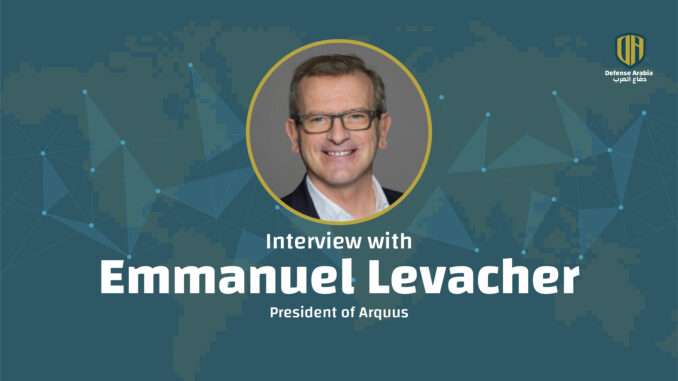
In an era where global defense needs are evolving rapidly, Arquus has emerged as a key player in the design, production, and customization of military vehicles and defense solutions. Under the leadership of its President, Mr. Emmanuel Levacher, the company has consistently demonstrated its commitment to innovation, adaptability, and strategic partnerships. With a strong presence in the Middle East—a region marked by both unique challenges and significant opportunities—Arquus continues to expand its footprint by delivering tailored solutions that meet the diverse operational requirements of its clients.
In this exclusive interview, Mr. Levacher shares insights into Arquus’s growth strategy in the Middle East, highlighting the importance of localization, customization, and collaboration with regional partners. He also delves into the company’s design philosophy, which prioritizes a balance between mobility, protection, and terrain adaptability, ensuring that Arquus vehicles remain battle-proven and reliable in the most demanding environments.
Additionally, Mr. Levacher discusses Arquus’s pioneering efforts in localizing production in Qatar, the operational advantages of its vehicles like the Sherpa, and the strategic synergies resulting from its acquisition by John Cockerill. He also provides a glimpse into the future of defense technology, including the development of unmanned ground vehicles (UGVs) and the introduction of the MURX, a vehicle specifically designed to address the needs of the Middle Eastern market.
Q: What are Arquus’s plans for growth in the Middle East, and how will you achieve them given the region’s specific challenges and opportunities?
A: The Middle East has always been a key region for Arquus, covering countries from Morocco to the Gulf nations. We have ongoing projects in various markets, including Morocco, Egypt, Kuwait, Qatar, Oman, and Saudi Arabia. Our approach depends on the specific needs of each country, as we offer a wide range of products, from light and medium vehicles to remote-controlled weapon stations.
A crucial aspect of our growth strategy is customization—tailoring our solutions to meet the operational requirements of our clients. Additionally, we prioritize partnerships with local industries. Many countries now demand localization, and we are fully open to licensing agreements, joint ventures, and local production. This regional approach ensures we remain competitive and aligned with each country’s defense strategies.
Q: How does Arquus balance speed, maneuverability, terrain adaptability, and armor in its vehicle designs?
A: Achieving the right balance between these elements is essential in our industry. Our design philosophy is based on reliability and operational simplicity rather than excessive electronic sophistication. We specialize in mobility and armor, using advanced steel treatments to ensure high protection levels without excessive weight.
In terms of mobility, we continuously enhance the power and agility of our platforms. The key is to deliver vehicles that are easy to operate, maintain, and deploy in challenging environments while offering the necessary protection for troops.
Q: Arquus is the first French defense company to localize military vehicle production in Qatar. What were the main challenges, and what lessons were learned from this experience?
A: Establishing localized production in Qatar was a pioneering step for us. We successfully set up a workshop for modernizing VABs, which proved to be a positive experience. The key to success was integrating three critical elements: utilizing Qatar’s military complex, hiring and training local talent, and leveraging international expertise.
Collaboration with the Qatari armed forces and our local partners ensured smooth operations. While challenges always exist in localization efforts, this project demonstrated the importance of balancing local and international capabilities to achieve long-term sustainability.
Q: Arquus provides vehicles like the Sherpa for Qatar’s internal security forces. What specific operational advantages do these vehicles offer?
A: The Sherpa and other Arquus vehicles are designed for ruggedness, reliability, and adaptability to local conditions. They perform exceptionally well in desert terrain and high-temperature environments, making them ideal for the Middle East.
Additionally, Arquus vehicles have a strong track record in combat environments. These are not just new designs but battle-proven platforms, ensuring high performance in real-world conditions.
Q: How does the acquisition of Arquus by John Cockerill align with the long-term growth strategy of both companies?
A: This acquisition creates a strong synergy between Arquus and John Cockerill. We specialize in vehicle platforms, while John Cockerill focuses on weapon systems. This complementarity allows us to integrate turret systems seamlessly with our platforms, offering complete solutions to clients.
At the same time, both companies maintain operational independence. Customers can opt for an Arquus platform with a different turret or a John Cockerill turret mounted on another vehicle. Flexibility remains a priority, ensuring we meet diverse customer needs.
Q: Is Arquus developing unmanned ground vehicles (UGVs)? If so, what are their intended applications, and what challenges do they face?
A: Yes, we are actively developing UGVs. One example is the Mule UGV, a small, electric unmanned ground platform designed for multiple roles. It functions as both a trailer and a drone, offering flexibility for various missions such as route clearance, logistics support, and fire support.
One of the biggest challenges in UGV development is defining clear operational use cases. Many armed forces are still experimenting with how these systems will integrate into their operations. We work closely with military clients to refine concepts and ensure UGVs provide real tactical advantages on the battlefield.
Q: The Arquus MAV’RX was introduced at Eurosatory. What makes it particularly well-suited for the Middle East region?
A: The MAV’RX was designed with Middle Eastern requirements in mind. It features high levels of protection (Level 4 for both ballistic and mine threats) while maintaining excellent mobility and payload capacity. This combination allows it to carry a full crew and medium-caliber turret systems without compromising agility.
By integrating superior protection, mobility, and firepower, the MAV’RX is well-suited for the region’s operational environment, providing an optimal balance of survivability and effectiveness in combat scenarios.






Be the first to comment